Publishing Talks: David Wilk interviews Kent Anderson
March 9, 2010 by David
Filed under PublishingTalks
 In this series of interviews, called Publishing Talks, I have been talking to book industry professionals, each of whom has a different perspective about the future of publishing, books, and culture. This is a period of disruption and change for all media businesses.
Publishing has been a crucial part of human culture for as long as people have been writing and reading.
In this series of interviews, called Publishing Talks, I have been talking to book industry professionals, each of whom has a different perspective about the future of publishing, books, and culture. This is a period of disruption and change for all media businesses.
Publishing has been a crucial part of human culture for as long as people have been writing and reading.
How will publishing evolve as our culture is affected by technology, climate change, population density, and the ebb and flow of civilization and its economics? Publishing Talks interviews help us understand the outlines of what is happening, and how we might ourselves interact with and influence the future of publishing as it unfolds. Publishing Talks interviews give people in the book business a chance to talk about ideas and concerns in a public forum that are often only talked about “around the water cooler,” at industry conventions and events, and in emails between friends.
I believe that these interviews give people inside and outside the book industry a chance to hear first hand some of the most interesting and challenging thoughts, ideas and concepts that are currently being discussed within the industry.
In this interview, I had the pleasure of talking to Kent Anderson, Editor-in-Chief of the Scholarly Kitchen, an Society for Scholarly Publishing member, and former Board member. Kent has a BA in English as well as an MBA. He is currently CEO/Publisher for the Journal of Bone & Joint Surgery. He formerly worked in the Massachusetts Medical Society’s Publishing Division in Product Development and International Business and as Publishing Director for the New England Journal of Medicine. He’s been a publisher, managing editor, copy editor, graphic designer, typesetter, editor, and author. He’s worked at the American Academy of Pediatrics, Medical Economics, and 3M, in addition to other odd jobs here and there (notice, this construction makes all the jobs odd). And interestingly, he also writes mystery novels in his spare time (he writes the Johnny Denovo Mysteries under the pen name Andrew Kent). He wrote a very intelligent article about publishing his latest book for the Self-Publishing Review. And lastly he is a member of an innovative authors’ collective Backwords Books. Busy guy!
We covered alot of interesting ground in our talk, starting with a long discussion about Jaron Lanier’s latest book, called You Are Not a Gadget, that Kent recently reviewed in depth in the Scholarly Kitchen, a book that raises a number of really interesting concerns about the way the open online economy is working. That was a great starting off point for a really interesting discussion about online publishing, devices, valuations and pricing, web business models, and many other related subjects.
Podcast: Play in new window | Download
Dolen Perkins-Valdez: Wench
March 4, 2010 by David
Filed under Fiction, WritersCast
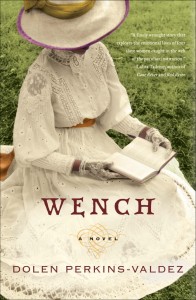 978-0061706547 – Hardcover – Amistad/HarperCollins – $24.99
978-0061706547 – Hardcover – Amistad/HarperCollins – $24.99
Dolen Perkins-Valdez’ first novel, Wench, just blew me away. The writing is beautiful, and the story is compelling. Perkins-Valdez has been able to imagine her characters in a very difficult time, in very difficult circumstances, capturing their pain and suffering as well as their joys, and the complexity of life lived by humans. No stick figures here, male or female, black or white. The author is sympathetic in the strongest sense of that word – she understands people. She does not excuse anything, but she is able to imagine who they are, and therefore her readers are given no excuses either. Here’s the story of the book (I took this from the author’s own website, which is one of the better author websites I have seen recently):
In 1851, a lawyer named Elias P. Drake purchased a plot of land near Xenia, Ohio with the intent to establish a summer vacation resort where the country’s elite could relax and enjoy the mineral springs in the area. At the time, it was believed that natural water could cure illnesses and bring about good health. What made this resort unusual, however, was that it became a popular vacation destination for southern slaveholders and their enslaved mistresses. Ultimately, these flagrantly open relationships offended the northern abolitionists who also frequented the resort. After four years, the resort closed.
This part of the story has been confirmed by historians. I took this forgotten historical note and sketched in a fictional account of what it would have been like to be an enslaved woman traveling to this free state each summer. Why wouldn’t the women try to escape? What kinds of emotional attachments did they have with these men? Initially, I believed that it was entirely possible that they actually loved the men. Ultimately, I discovered that it was much more complicated than that.
Situated in the free state of Ohio, Tawawa House offers respite from the summer heat. A beautiful, inviting house surrounded by a dozen private cottages, the resort is favored by wealthy Southern white men who vacation there, accompanied by their enslaved mistresses.
Regular visitors Lizzie, Reenie, and Sweet have forged an enduring friendship. They look forward to their annual reunion and the opportunity it affords them to talk over the changes in their lives and their respective plantations. The subject of freedom is never spoken aloud until the red-maned, spirited Mawu arrives and voices her determination to escape. To run is to leave behind the friends and families trapped at home. For some, it also means tearing the strong emotional and psychological ties that bind them to their masters.
When a fire on the resort sets off a string of tragedies, Lizzie, Reenie, and Sweet soon learn tragic lessons,that triumph and dehumanization are inseparable and that love exists even in the cruelest circumstances as they bear witness to the end of an era.
That’s the bare bones of the story. Obviously, you need to read this book to understand how good it is. And do listen to this interview. In it, Dolen talks about how she became a writer, how this book came about, how she feels about her characters, and a great deal more. Dolen Perkins-Valdez is a writer who deserves our attention. I’m very much looking forward to her next book, and hoping she will be writing many more after that.
As an aside, the cover is beautiful, and perfect for this book, and has a sort of subliminal effect on me, which maybe contributed subtly to how much I liked reading this book and talking to its author.
Podcast: Play in new window | Download
Publishing Talks: David Wilk interviews Morgan Entrekin
February 26, 2010 by David
Filed under PublishingTalks
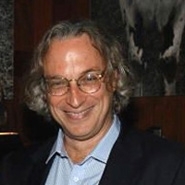 In this series of interviews, called Publishing Talks, I am talking to book industry professionals who have varying perspectives and thoughts about the future of publishing, books, and culture. This is a period of disruption and change for all media businesses.
Publishing has been a crucial part of human culture for as long as people have been writing and reading.
In this series of interviews, called Publishing Talks, I am talking to book industry professionals who have varying perspectives and thoughts about the future of publishing, books, and culture. This is a period of disruption and change for all media businesses.
Publishing has been a crucial part of human culture for as long as people have been writing and reading.
How will publishing evolve as our culture is affected by technology, climate change, population density, and the ebb and flow of civilization and its economics? Publishing Talks interviews help us understand the outlines of what is happening, and how we might ourselves interact with and influence the future of publishing as it unfolds. Publishing Talks interviews give people in the book business a chance to talk about ideas and concerns in a public forum that are often only talked about “around the water cooler,” at industry conventions and events, and in emails between friends.
I hope that Publishing Talks interviews will give people inside and outside the book industry a chance to hear about some of the thoughts, ideas and concepts that are currently being discussed by engaged individuals within the industry.
Morgan Entrekin is the iconic publisher of Grove Atlantic, one of the most prominent and successful midsized literary publishers of the past couple of decades. He has all the chops of a “traditional” book publisher: a great commitment to authors and their texts, a belief in the enduring power of a great backlist. But he is also an astute marketer who understands readers and the necessity for publishers to pay attention to what readers want and need.
Entrekin grew up in Nashville, graduated from Stanford in 1977, started in the business at Delacorte Press, working under the late, great Seymour Lawrence and editing the likes of Jayne Anne Phillips, Richard Brautigan, and Kurt Vonnegut. In 1982 he moved over to Simon & Schuster, where he made his name by championing, acquiring and editing Bret Easton Ellis’s breakout novel Less Than Zero. In 1984 he created his own imprint within Atlantic Monthly Press, Morgan Entrekin Books and a few years later he bought Atlantic outright; two years after that, he purchased Grove Press, which featured one of the great backlists that included D.H. Lawrence, Henry Miller, and Samuel Beckett.
Entrekin’s gained well deserved fame and credit for publishing Charles Frazier’s Cold Mountain in 1995. In the course of promoting the novel, Entrekin is credited with more or less creating the pre-publication tour, sending Frazier to meet book buyers in various cities before the book landed in stores. It paid off: Cold Mountain was a huge success, sold over 1.5 million copies, won the National Book Award, and was made into a big-budget Hollywood movie. Other notable Grove/Atlantic titles include Mark Bowden’s Black Hawk Down, Candace Bushnell’s Sex and the City, as well as the works of Sherman Alexie and P.J. O’Rourke.
We had a terrific talk, covering a wide range of interesting topics, from the current state of the book business, to the kinds of things that Entrekin is doing at Grove/Atlantic to stay current. Morgan is thoughtful, intelligent and incisive on every topic he discusses; he cares deeply about the books he publishes, backlist and frontlist titles alike, and is clearly still motivated and excited by the same beliefs and ideas that brought him into the book business in the first place. Anyone interested in understanding how a publisher can navigate the changing landscape of the business will benefit from listening to what he has to say in this interview.
Podcast: Play in new window | Download
Kelli Stanley: City of Dragons
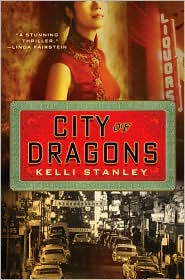
978-0312603601 – Hardcover – Thomas Dunne/Minotaur Books – $24.99
Reading Kelli Stanley’s City of Dragons was a pleasure from beginning to end. I liked her incredible attention to details in the San Francisco of the 1940s setting. I really liked her main character, the wounded private eye, Miranda Corbie. Kelli’s love of noir fiction, and love for a great story really show. Good fiction should be able to take you into another place and time coupling the author’s skills with your own imagination. This book certainly succeeds in grabbing you early, and keeping your attention. Anyone who has read and loved the great classic detective novels will feel at home with Kelli Stanley’s writing. And she has that political edge that so many writers of the 30s and 40s brought to their work.
There’s a lot going on here. You can feel San Francisco in the dark of pre-World War II, taste the cigarettes and booze, and feel the very real danger her characters experience, the otherness of Chinatown, and the deaths and broken lives that dot this sometimes harsh and painful cityscape. And you can feel throughout how much heart and soul the author has put into this book. It’s a pleasure to read, and has a story that won’t let go. Lots of fun overall, and City of Dragons works on many levels, so it will satisfy readers looking for entertainment or something with a bit more depth as well.
Kelli loves her work and loves to talk about it too, so we had a great conversation. This is a writer with a great future and I am very much looking forward to her next book. I’m also hoping to get her to contribute a reading from this novel to Writerscast in the near future. Kelli’s own website is worth a visit as well. City of Dragons is available as an e-book in various formats, and in digital audio as well.
Podcast: Play in new window | Download
Publishing Talks: David Wilk interviews Richard Curtis
February 11, 2010 by David
Filed under PublishingTalks

In this series of interviews, called Publishing Talks, I am talking to book industry professionals who have varying perspectives and thoughts about the future of publishing, books, and culture. This is a period of disruption and change for all media businesses.
Publishing has been a crucial part of human culture for as long as people have been writing and reading.
How will publishing evolve as our culture is affected by technology, climate change, population density, and the ebb and flow of civilization and its economics? Publishing Talks interviews help us understand the outlines of what is happening, and how we might ourselves interact with and influence the future of publishing as it unfolds. Publishing Talks interviews give people in the book business a chance to talk about ideas and concerns in a public forum that are often only talked about “around the water cooler,” at industry conventions and events, and in emails between friends.
I hope that Publishing Talks interviews will give people inside and outside the book industry a chance to hear about some of the thoughts, ideas and concepts that are currently being discussed by engaged individuals within the industry.
Richard Curtis, president of Richard Curtis Associates, Inc., is a leading New York literary agent and a well-known author advocate. He is also the author of numerous works of fiction and nonfiction including several books about the publishing industry. His interest in emerging media and technology has enabled him to help authors anticipate trends in publishing and multimedia. He has lectured extensively and conducted panels and seminars devoted to raising consciousness in the author and agent community about the future of communications. He was the first president of the Independent Literary Agents Association and subsequently president of ILAA’s successor organization, the Association of Authors’ Representatives (AAR) He blogs regularly on www.ereads.com. He is also, uniquely among literary agents, a publisher himself, having founded the innovative digital publishing imprint, E-Reads almost ten years ago.
I have known Richard for a very long time, have done business with him, and collaborated with him on an experimental publishing project a few years ago, But mostly, over the years, Richard and I have talked about the book business, the future of publishing and of authors, and particularly, the future of digital publishing. So it made a lot of sense for me to talk to Richard as part of the Publishing Talks series, as I knew he would have a great deal of interesting and compelling ideas to share about these subjects, which he almost always does.
Podcast: Play in new window | Download
David M. Carroll: Following the Water
February 7, 2010 by David
Filed under Non-Fiction
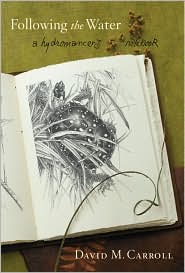 978-0547069647 – Hardcover – Harcourt Houghton Mifflin – $24.00
978-0547069647 – Hardcover – Harcourt Houghton Mifflin – $24.00
David M. Carroll has been “following the water” for almost his entire life. He grew up in Connecticut, then lived in Massachusetts, and moved to New Hampshire to find places less disturbed by humans, where he could study turtles and their woodland, waterine habitats. Which he has done now for many years. Following the Water is subtitled “A Hydromancer’s Notebook; a hydromancer would be one who divines by the motions or appearance of water, which is certainly descriptive of what David Carroll does in his life and in this book, a poetic journal of a year of divining the natural world by close observation of it.
Most of us spend far too little time in nature, and many of those who do “use” the natural world for entertainment or work in a way that would be difficult to distinguish from how they treat the non-natural world. What is so beautiful about Carroll’s work and his writing about it, is the depth of his observation, and his literal being in place. Reading his elegiac descriptions of the watery environments of New England transported me to an almost metaphysical trance-like state of mind where I could imagine myself inhabiting the outside space in which he spends so much of his time.
Of course there is a terrible sadness in this book, as Carroll experiences the changes in the places he has known so well and so long, always brought on by the effects of constantly encroaching human development. He knows the turtles and their environments will soon be threatened and knows there is almost nothing that can be done to protect them. This is a feeling that many who work in and strive to protect our remaining wild places share, an ever present sense of desperation, as we near the tipping point of urban and suburbanization.
Carroll writes beautifully, and his drawings are exquisite. Reading this book made me wonder how I had managed to miss reading his earlier books, and has spurred me to go out and get them all. Here’s a perfect example of the quiet power of his prose:
“As daylight diminishes, the peep-frog chorus intensifies in the backwaters of a fen a quarter mile away. With raucous clamor and a rushing wind of wings beats a flurry of grackles lifts off from the topmost canopy of the red maple swamp. In the quieting that follows, I hear again the drift of evensong from their red-winged cousins on the far side of the wetland mosaic. The season, like the water glimmering all around, extends before me.”
David Carroll is as enjoyable to hear talking as his writing is to read. Interviewing him was a pleasure, tinged with a shared sense of dismay about what has happened to our shared New England natural environment. Both this book and this talk are among my favorites, and I hope listeners will agree.
Podcast: Play in new window | Download
Matthew Aaron Goodman: Hold Love Strong
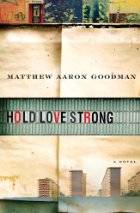 978-1416562030 – Hardcover – Simon & Schuster Touchstone – $24.99
978-1416562030 – Hardcover – Simon & Schuster Touchstone – $24.99
This is flat out one of the best books I have read in a long time. It begins with an incredible story that grabs you instantly and will not let go. I felt like I was holding my breath almost throughout the book. Matthew Aaron Goodman avoids cliches at every turn, loves his characters, demands respect for them from beginning to end, but never hides from the pain and suffering they experience. As readers, we feel like we are living in, through and with his characters, which is a triumph of both the author’s imagination and his deeply felt love for the people he writes about.
It’s difficult to believe that this is Goodman’s first novel. His mastery of language, his ability to inhabit the hearts and souls of his characters, and the simple clarity of his voice are all remarkable for any author, much less a first novelist. I was blown away, and have been recommending this book widely to friends and colleagues.
Cornel West gave it a very fine blurb that is worth reprinting here: “Matthew Aaron Goodman’s Hold Love Strong is a powerful and poignant story of the gallant Abraham who struggles on the night side of American society yet exudes a light of genuine hope. Goodman is an activist and artist who never loses sight of the humanity of those either imprisoned or free!”
I also recommend readers to visit Matthew’s own site where you can read some more of his work. In 2007, working hand and hand with formerly incarcerated men and women, Matthew created The Leadership Alliance, a community empowerment project that unites recently freed people with volunteer partners. And there is a wonderful review of Hold Love Strong by Nina Sankovitch on Readiac that I think describes perfectly the power and impact this book can have on readers.
In my interview with Matthew, we talked about his own life story to help understand how he came to write Hold Love Strong, the work he has done in New York communities and elsewhere, and alot about the book itself, its characters and story, and of course what he is working on now. He is as compelling talking about his work and ideas as he is writing about them.
Podcast: Play in new window | Download
Publishing Talks: David Wilk Interviews David Rothman
January 26, 2010 by David
Filed under PublishingTalks
 In this series of interviews, called Publishing Talks, I am talking to book industry professionals who have varying perspectives and thoughts about the future of publishing, books, and culture. This is a period of disruption and change for all media businesses.
In this series of interviews, called Publishing Talks, I am talking to book industry professionals who have varying perspectives and thoughts about the future of publishing, books, and culture. This is a period of disruption and change for all media businesses.
Publishing has been a crucial part of human culture for as long as people have been writing and reading.
How will publishing evolve as our culture is affected by technology, climate change, population density, and the ebb and flow of civilization and its economics? Publishing Talks interviews help us understand the outlines of what is happening, and how we might ourselves interact with and influence the future of publishing as it unfolds. Publishing Talks interviews give people in the book business a chance to talk about ideas and concerns in a public forum that are often only talked about “around the water cooler,” at industry conventions and events, and in emails between friends.
I hope that Publishing Talks interviews will give people inside and outside the book industry a chance to hear about some of the thoughts, ideas and concepts that are currently being discussed by engaged individuals within the industry.
David Rothman grew up in the D.C. area, went to the University of North Carolina and worked as a reporter for the Journal in Lorain, Ohio, where he covered poverty and public housing and was a feature writer. Among other stories, Rothman chronicled the aftermath of the Kent State massacre.
Related distantly to the late Hollywood scriptwriter Arnold Belgard, Rothman is the author of six nonfiction books on technology-related topics and lives with his wife, Carly, in Alexandria, Virginia. He is well known on the Internet and among digerati for having created and operated TeleRead, a popular site devoted to libraries and technology and recently has published a novel based on real-life Washington, D.C., The Solomon Scandals.
I talked with David Rothman about his long history of involvement in technology, the internet and digital reading alternatives, with emphasis on Teleread, and we then moved on to cover some of the current issues of the day, including the business structure of the rapidly growing e-publishing marketplace, copyright issues in the digital era, and how the web might enable new compensation models for authors and other creators. David displayed his typical verve and journalist’s willingness to tackle any subject and every challenge.
Podcast: Play in new window | Download
Lew Paper: Perfect-Don Larsen’s Miraculous World Series Game and the Men who made it Happen
January 18, 2010 by David
Filed under Non-Fiction
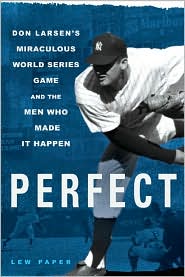
978-0451228192 – Hardcover – New American Library – $24.95
An entire book about one baseball game is probably unimaginable to many people. Even diehard fans, even those who feel they have heard the story of Don Larsen’s unique feat more than enough times, will be surprised at how easy this book is to (avidly) consume. Lew Paper manages to keep our attention, even though we know how the story comes out, even though we may know the game, the players, the era so well. And there are plenty of surprises in these pages.
Paper is a very good writer, almost effortless, and a he is a natural storyteller who plainly loves the material he is writing about. He uses the game as the structure for telling much more than the story of a single game, of course. He portrays many of the players in this game, Dodger greats like Jackie Robinson, Carl Furillo, Roy Campanella, Junior Gilliam, and hard-luck pitcher Sal Maglie, the powerful Yankee team of the fifties, which sported Mickey Mantle, Yogi Berra, Billy Martin, Gil McDougal, Moose Skowron and Hank Bauer, all in the prime of their careers. He brings to life the story of this great team rivalry between two boroughs of the greatest city on earth in the middle of the 1950s, an era that still can fascinate and enthrall us. And of course baseball is the constant through time, whose essence does not change at all.
It does help to be a baseball fan to like this book, I am sure, and maybe having grown up in or near this great era of intra-New York City competition adds to one’s interest as well. It was definitely a different time than today, when even star players held real jobs during the off season, and the amount of money won in a World Series could be just enough to give a player some modest luxuries and fleeting financial security. And of course many of these players had grown up during the Depression, lived through or even fought in World War II or the Korean War. That may account for some of the different attitudes and behaviors they exhibited on the field and among friends.
But there can be no doubt that Lew Paper has brought this game, these players, this era, vividly to life in a beautiful and brilliant manner. Talking to him about this book, the research he did to write it, and some of his experiences in talking to surviving players, relatives and witnesses to Don Larsen’s spectacular (and still unique) feat , was a great pleasure for me. I do love baseball, the game and its history have a terrific pull on me, as it does on many others, but baseball is also just a wonderful lens through which to see human beings, our culture, our foibles, our strengths and our desires. Thanks to Lew Paper for this book and a terrific interview about it.
Podcast: Play in new window | Download
Tom Matlack: The Good Men Project
January 15, 2010 by David
Filed under Non-Fiction
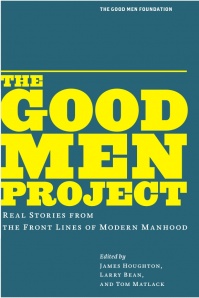 978-0615316741 – Paperback – The Good Men Foundation – $14.99
978-0615316741 – Paperback – The Good Men Foundation – $14.99
A bit more than year ago, longtime friends and former venture capitalist partners Tom Matlack and James Houghton began talking about exploring the meaning of manhood by getting men to share their stories. Today, the Good Men Project is a nonprofit foundation that benefits at-risk boys through the sales of its recently released book and a companion documentary, both titled “The Good Men Project: Real Stories from the Front Lines of Modern Manhood.” The book is a collection of 31 essays by men from all over the country, gay and straight, revealing experiences that are often harrowing but ultimately redemptive. There’s also a DVD of the film available.
Not long ago, I read a story about this book and the fact that the editors could not find a publisher (“no one wants to read about men”). Being entrepreneurs and successful business people, of course they went ahead and published the book themselves – and did a very nice job of it too. The book is divided into sections – Fathers, Sons, Husbands, Workers – pretty much all the categories that men will identify themselves at one time or another. The stories are powerful, emotional without being cloying or sentimental, transformative, in some cases, plain and simply the telling of personal truths that benefit others.
This is a new generation of men talking about their lives, and while some things are different for men certainly than they were in the era when talking about one’s emotional life was unimaginable and unaccepted, it’s still not easy for men to talk meaningfully about the real things that motivate them, or worry them, or even scare them deeply. The book certainly resonated with me, as I am sure it will for many men.
The Good Men Project is not, however, about therapy and simply talking to each other. There’s a real agenda here, to make a difference, to make change, to do good (The Good Men Foundation is a registered New York State 501(c)(3) charitable corporation dedicated to helping organizations that provide educational, social, financial or legal support to men and boys at risk. All proceeds from the sales of The Good Men Project: Real Stories from the Front Lines of Modern Manhood book and documentary film DVD will be distributed to the Foundation and will be used exclusively for the charitable mission of the Foundation).
The book features a wide range of writers, some professionals, many not. The writing is very good throughout. My interview with Tom Matlack covered alot of territory, including the story behind the whole project, and about this book, the other men who are involved with it, and how the Good Men Project works. This is a valuable effort that I hope will be broadly successful.
Podcast: Play in new window | Download
